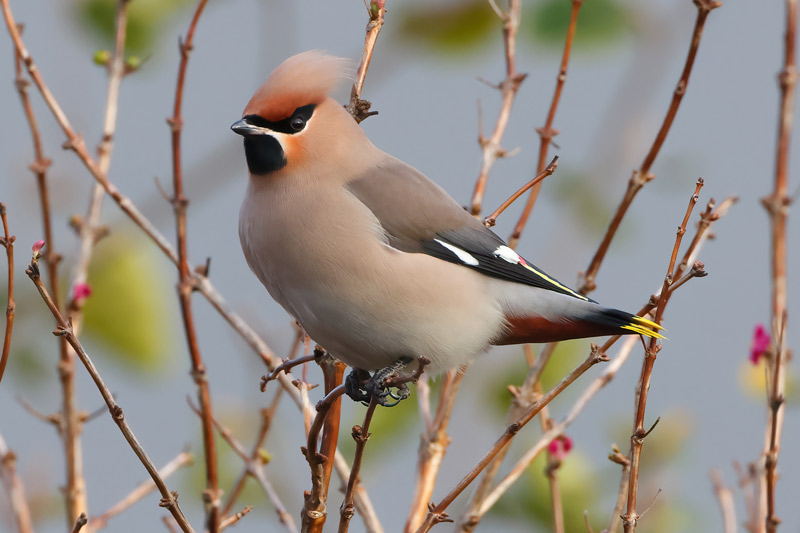Birds and other wildlife need a helping hand during a cold snap, the RSPB warns.
- With temperatures set to drop, wildlife lovers are urged to give birds a lifeline with three simple tips that can help garden visitors survive the winter
- The weather is set to draw more birds to our gardens and local greenspaces in search of food, so your feeder could be a flurry activity over the coming weeks
With many parts of the country braced for snow and icy temperatures this winter, wildlife charity the RSPB is appealing to the public to take some easy steps to help our wild neighbours.
As natural food supplies run low, the colder weather is set to draw more birds and other wildlife to our gardens and greenspaces over the coming weeks in search of food, water and shelter.
Birds need more energy to stay warm at this time of year and have less daylight to find food, while the countryside has been stripped bare of the food sources they rely upon.

Waxwing, copyright Glyn Sellors, from the surfbirds galleries
Therefore, in response to their plight, and the lower temperatures forecast for the coming weeks, the RSPB are sharing their top three steps that can help the wildlife on your doorstep:
1: A feathered friend feast: Waste not want not! Kitchen scraps like mild grated cheese, bruised fruit, cooked rice, unsalted bits of hard fat, roast potatoes and dry porridge go down a treat with garden birds. You can provide an excellent full-fat winter food by making your own bird cakes or fat balls. The RSPB also suggests calorie-rich foods like mixed seed, sunflower seed, nyjer seed and good quality peanuts.
2: Keep it fresh: Birds make use of fresh water for drinking and bathing all year round but finding sources of water can be hard at this time of year with freezing temperatures. Be sure to check your bird bath isn’t frozen and keep it topped up with fresh, clean water. Keeping your feeders clean is also essential to help reduce the spread of disease – the RSPB recommends cleaning them once a week with a mild detergent solution, such as washing up liquid. Remember to wear gloves and discard of any unused or mouldy food!
3: Provide shelter from the elements: Providing shelter from the harsh weather goes a long way in helping our feathered friends. Planting dense hedges such as privet or hawthorn or letting ivy and holly grow will provide a great place for birds to roost in and shelter from the elements. Nestboxes are also readily occupied on cold winter’s nights, with birds cosying up together for communal warmth. The record number of birds found in one box is 63 wrens!
Carrying out these three steps could see your garden become a flurry of activity this winter, all in time for the RSPB’s Big Garden Birdwatch, taking place on 27-29 January.
As the RSPB’s wildlife enquiries manager, Charlotte Ambrose, describes: “There is no better time to be feeding garden birds than during the winter, whether that be with favourites like fat balls or with kitchen scraps like grated mild cheese and bruised fruit. As many of our feathered friends look for alternative food sources as natural supplies run low, a flutter of wings at your feeder can bring an immense sense of joy.
With the RPSB’s Big Garden Birdwatch just around the corner there is no time like the present to get acquainted with your garden visitors. This free event in January saw nearly 700,000 people take part last year, telling us about the birds they saw in their garden or greenspace during one hour to help us to monitor garden bird populations.”
To find out more about the Big Garden Birdwatch and how you can take part for free, visit rspb.org.uk/birdwatch.